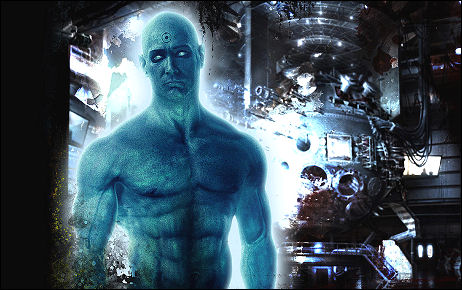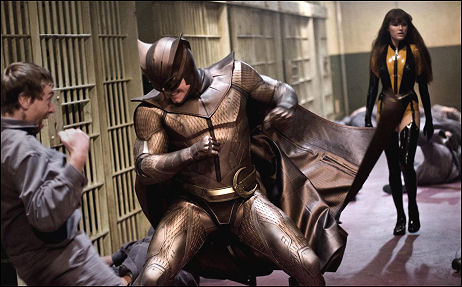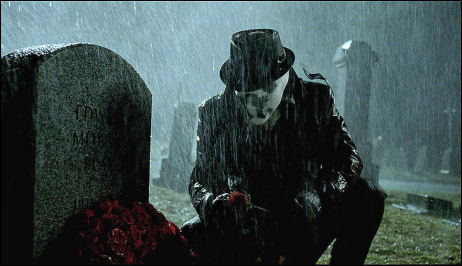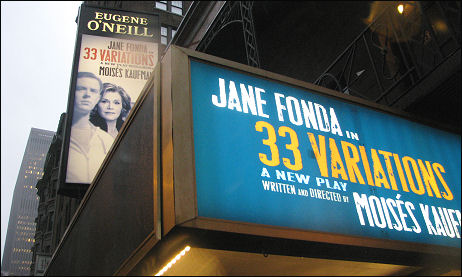Film Jerk‘s annual series of Oscar Handicap articles are now online, starting with Best Picture.
Month: February 2009
Four, Maybe Five Films
From a purely spitballed perspective, what are the most likely 2009 Best Picture contenders at this point in time? Precious few. The only Coming Soon December releases that look like remote possibilities include James Cameron‘s Avatar, Peter Jackson‘s The Lovely Bones and Clint Eastwood‘s rugby-themed Mandela movie.
The only November release that may have a reasonable (but by no means certain) shot is Rob Marshall‘s Nine. There’s nothing at all in the October rundown right now.
There’s also — just blindly speculating — Alejandro Gonzalez Inarritu‘s Biutiful,which has no release date and may not be seen until 2010. It’ll costar Javier Bardem and Ruben Ochandiano.
One thing’s for sure: An Education‘s Carey Mulligan will be in the running for Best Actress.
Review this Playlist piece from last month called “The 60 Most Anticipated Films of 2009” and you’ll see damn few comers.
It’s way early, all kinds of exciting manifestations are waiting in the wings and you obviously can’t tell anything at this stage, but you’d be hard put to call ’09 an exciting-looking year at this stage.
Sidelines
Among Esquire.com’s Alternative Oscar salutations, which were posted earlier today. Actually there are only three that got me.
(a) The most moving monologue of the year delivered by Jean Claude van Damme in JCVD, to wit: “When you’re 13, you believe in your dream. Well, it came true for me. But I still ask myself today what I’ve done on this earth. Nothing! I’ve done nothing!”
(b) Best Profane Dialogue from In Bruges, from a conversation between an Irish assassin (Brendan Gleeson) and his gangster boss (Ralph Fiennes).
Ken [Gleeson]: “Harry, let’s face it. And I’m not being funny. I mean no disrespect, but you’re a cunt. You’re a cunt now, and you’ve always been a cunt. And the only thing that’s going to change is that you’re going to be an even bigger cunt. Maybe have some more cunt kids.” Harry [Fiennes, furious]: “Leave my kids fucking out of it! What have they done? You fucking retract that bit about my cunt fucking kids!” Ken: “I retract that bit about your cunt fucking kids.” Harry: “Insult my fucking kids? That’s going overboard, mate!” Ken: “I retracted it, didn’t I?”
(c) Best piece of clothing — the white gloves in Funny Games. “The plain white gloves worn by the sadistic neighbors conjure at once the cruel indifference of butlers, scientists, and the guy who puts the ball back on the table in professional snooker. Those gloves say more about the human condition than the entire wardrobe of Sex and the City.”
I’m not so sure about the white gloves, now that I’ve thought a bit more about it.
Dumbest Settlers of All Time
Several years ago film historian Ron Haver raised a point about the Skull Island wall in the original King Kong (’33) that was so fundamental that it had been ignored for decades. Why, Haver asked, did the natives build a huge gate in the wall that was big enough to allow 30-foot tall apes and dinosaurs to walk through?

I have a similar-type question about John Ford‘s relentless use of Monument Valley as a backdrop in his westerns, particularly his use of it in The Searchers. Why are people there in the first place? There was no reason at all for settler types to live there in the old days because MV is a 100% worthless area for farming and cattle-raising. No rivers for trade, no railroads, no cottage industry of any kind. It’s just scenery.
The dry typography tells you there’s not much in the way of rainfall. There don’t seem to be any rivers or lakes nearby. There’s no grass for cattle herds to feed upon. One look tells you there’s no nutritious soil to grow crops with. There was no such thing as tourism in the settler days. The only settler-sustaining industry of any kind was uranium mining, which reportedly happened between 1948 and 1967.
And yet decade after decade film monks have been praising the John Ford Monument Valley westerns without so much as mentioning — not once! — the absolute idiocy of anyone living in such an environment during the 1800s or early 1900s. The reason for this willful logical shutdown is that Monument Valley is infused with such a tremendous sense of myth and grandeur that it’s regarded by film buffs as a kind of spiritual cathedral.
Every time I watch The Searchers, I ask myself “what the fuck are all those settlers doing there? What’s the damn point?”
No Holmes Reshoots
Yesterday evening a Hollywood Reporter story, written by Stuart Kemp and sourcing Warner Bros. execs, refuted a report in London’s Sun that the studio had asked director Guy Ritchie to reshoot parts of Sherlock Holmes.
Damn straight. If I was running Warner Bros. production I wouldn’t dream of telling Ritchie to re-shoot Sherlock Homie — it’s perfect as is! A kickboxing James Bondian Holmes with a totally buff bod. Maybe he’ll have the ability to fly or at least leap like a tiger and run up walls like the martial-arts guys do. Maybe he’ll be able to deliver a blow so powerful he can send villains crashing through brick walls. None of that tweedy-ass Basil Rathbone stuff, no deerstalker hat or Inverness overcoat….balls to the wall!
Lay It On
On Collider late yesterday afternoon Steve Weintraub reported on a chat with Watchmen director Zack Snyder, and the big news is that the Watchmen DVD/Blu-ray will have two much longer versions of the film. One will be a 3 hour and 10 minute director’s cut and another cut with “Tales of the Black Freighter” that will run 3 hours and 25 minutes. The theatrical cut runs 2 hours and 36 minutes.
That Whooshing Feeling
A Watchmen screening happened last night at L.A.’s AMC Century City plex. Attendees included press (including HFPA), studio folk, friends of studio folk and random-off-the-streeters. It was 20 minutes late starting, but a friend of HE attended and his basic verdict is that Tuesday’s early-bird review was pretty much on point.

“By far the highlight of the film is the opening credits,” he begins. “It perfectly nails the surrealist tone of the graphic novel and does an adequate job of running through some of the back story of the Watchmen. It’s so good I’m half-convinced that director Zack Snyder had little to do with this sequence. Because that’s where the surrealism ends.
“The rest of Watchmen basically alternates between campy silliness and 2nd-rate comic book melodrama. At some points on the level of live-action Teenage Mutant Ninja Turtles. I assume Snyder was trying to hit that sweet spot of surrealism that accompanies the alternate 1985 reality of the graphic novel, but the kindest thing I can call it is a kind of tragedy/campy combo.
Interjected warning: appendage spoiler ten paragraphs hence!
“The violence and action is still 300-rific. Snyder can’t seem to help himself – slow-mo for slow-mo’s sake and lots of loud whooshing and thudding for every punch and collision. Maybe they should have pulled out the old Adam West Batman on-screen “Wham!” titles? It was that over-the-top, that silly. And let’s not forget the blood (deep reds, lotsa squirting) and cracking bones
“There’s certainly no sense of tension or release in any of the action sequences. Apparently, that shit is just supposed to look cool.
“Connected to the action is the film’s unexplained pseudo-super powers the Watchmen all seem to have. In the graphic novel, it’s made very explicit that none of them have super powers (except for Dr. Manhattan). And yet Snyder allows them all to jump really high and punch and kick baddies across the rooms, again with lots of whooshing and thudding. Fists and bodies break through walls like action in a Terminator or Superman film. And it’s never explained.

“With the exception of using Bob Dylan during the opening credits, somewhat successfully, the music left me speechless. One bad stick-out is a piece of Hendrix near the final confrontation, which seemed completely misplaced to me. The rest of the music is a smattering of random and very recognizable 80’s pop songs randomly pasted over scenes and scene transitions. It continually takes you out of the story. Really bad stuff.
“As Dr.Manhattan, Billy Crudup refuses to mail it in and Jackie Earle Haley‘s Rorschach is a great presence — one of the few characters/performances with any weight in the film. But Malin Akerman‘s Silk Spectre II is cringe-inducing throughout. Her performance (combined with the music) takes you out of the story at every turn. And you’re going to love the bad Nixon — bad make-up and accent (seriously!). It’s particularly hilarious coming on the heels of the great Frank Langella‘s Frost/Nixon performance.
Interjected warning: appendage spoiler five paragraphs hence!
“The film is probably 90% accurate to the graphic novel, and I’m not sure this is a good thing. Fear of the fanboys may have done them in. With no flexibility to explore the characters and scenes, much of the film is a rote viewing experience. No ramping up or down of character development, suspense or action. It’s simply ‘next’, ‘next’ and ‘next’ — like clicking through a viewfinder.
“Look, the graphic novel has some real thought to it and probably the only positive from the rote almost faithful adaptation was that Snyder wasn’t able to completely remove some of the larger themes embedded within the crazy (sometimes cool) world of the Watchmen. Having read the graphic novel and its disjointed narrative, I understood this was always going to be a difficult adaptation into a cohesive narrative, one that would plant its antagonist flag early on the horizon and then work its way to that mark, but the filmmakers don’t even try here.

“Nor did they embrace the reflexive joy that can spring forth from a disjointed narrative. There’s some meat on the bone at the end of the film which lends itself to lingering thought (a classic ‘sacrifice the few for the many’ dilemma); yet even this is undercut by a weird final scene between the love interests. Are we supposed to be contemplating this classic dilemma or are we expected to feel warm and fuzzy because Akerman and Patrick Wilson‘s Nite Owl still get to play house?
“There were certainly no cheers at the end. About 80% of the audience rushed out of the theatre the second the credits began; minimal congregating outside. I did come across a group of three 20-something guys, holding their free give-away Watchmen posters, seemingly doing their best to talk themselves into liking the film.
“I almost don’t want to spoil this for you, but there’s a lot of blue penis in this film. Sadly, I’d say this was one of the few surprises and entertaining parts of the entire experience. It’s not everyday that a mainstream Hollywood movie flashes blue Johnson!
“Who am I? A regular moviegoer who sees anywhere between 85 to 100 films per year. I’m down with popcorn fare when it at least tries or knows it’s silly, but I also do my best to seek out foreign and independent fare. I liked the Bourne series, Dark Knight, first two X-Men. However, I hated 300 (a 2-hour long video game-slash-slow motion campfest). I appreciated the Watchmen graphic novel but was ultimately bored by its jagged and stiff storytelling.”
Abe Goes Down
Kim Masters has updated her Slate/”Big Money” piece about the fate of Steven Spielberg‘s Lincoln project, and she says that “a knowledgable source [informs] that Paramount has passed” on the project.
This is all Spielberg’s fault since he’s the one who’s delayed and delayed and delayed and delayed. A subject of this depth and scope is beyond his abilities and he knows it, which is the deep-down reason why he’s been putting it off, I believe. Spielberg has already blown it by not shooting the film in ’07 or ’08, as releasing a Lincoln biopic right now would be perfect with Obama and the 200th anniversary and all. Later? Not so much.
The best thing that could happen to the Lincoln project would be for Spielberg to walk away and focus on directing and producing CG theme-park movies for the rest of his life — Indy 4, Tintin, Transformers 2, crap like that.
The Departed
Defamer posted an Oscar telecast death-montage questionaire earlier today. Here are my comments/answers for now:
(1) Will They Make It? (Choose One) — Arthur C. Clarke and Bernie Brillstein, for certain!; (2) Will Open the Montage — who cares but if they don’t put in Charles H. Joffe, Stan Winston, Harold Pinter and Isaac Hayes the montage guys will be guilty of dereliction; (3) Will End the Montage — a tie between Paul Newman and the team of Sydney Pollack and Anthony Minghella; (4) Will Get Montage’s First Video Clip — Newman (the picnic scene from The Hustler) or Roy Scheider (“You’re gonna need a bigger boat”); (5) Will Get Montage’s First Sound Clip — Paul Scofield (something from A Man For All Seasons); (6) First Actor/Actress Named — no comment, don’t care; (7) First Director Named — could be Jules Dassin, Minghella or Pollack…or they could be the last (who gives a shit about this stuff?); (8) First International Auteur Named — nobody cares; (9) Oldest Selection — Dassin; (10) Will Get His Own Montage Elsewhere in Oscarcast — either Newman or Pollack. (Not Charlton Heston because of his NRA support).
Hooves and Horns
Asked what he thinks about the 20th Century Fox-Warner Bros. battle over the distribution rights to Watchmen, screenwriter David Hayter has, according to this Hollywood Outbreak interview, called Fox “satan.” Hayter doesn’t mean the publicists, does he? He should be more specific. The correct thing would be to call the parties actually responsible for the legal challenge (i.e., Fox attorneys) “Satan’s emissaries,” “sons of Satan,” “the fallen angels” or words to that effect.
Off The Ground
Jane Fonda must be feeling like $10 million bucks these days. Make it $100 million. 33 Variations, the Broadway play I saw her perform in this afternoon, is a bracingly well-written, inventively staged, and deeply moving piece about fighting the demons of finality while living to the fullest, and it’s given Fonda’s comeback effort (which began about five years ago, give or take) the lustre and respectability that Hollywood failed to provide with Monster-in-Law (’05) and Georgia Rules (’07).

Fonda, yes, agreed to star in these films of her own free will but God, what a putrid and fallow place Hollywood can seem at times, especially from the perspective of the New York stage. But there’s nothing like a crackerjack Broadway play to put the rose back in everyone’s cheeks.
How good is Fonda? Very. She’s obviously deeply into what this play is about — love, passion, giving your utmost until the last. She’s confident, focused, commanding, and very connected. But so are costars Samantha Mathis, Colin Hanks (his first Broadway role), Zack Grenier, Don Amendiola and Susan Kellerman.
Directed and written by Moises Kaufman, 33 Variations doesn’t officially open until March 9th, but I can at least offer some generic alpha vibes at this stage of the game. It’s a good thing all around for Fonda, her costars, Kaufman and the audience. I left the theatre an hour or so ago feeling more than a little turned on. (I can’t do anything about the asswipes out there who will interpret that to mean something other than spiritual arousal.) The first thing I said to Roger Durling, who saw it with me, was, “I could see that again.”
Fonda plays Katherine Brandt, a somewhat emotionally remote music scholar (at least as far as Clara, her daughter, is concerned) trying to understand why Ludwig van Beethoven — whose career and powers were beginning to decline, and who needed money — spent 3 years writing 33 variations on a mediocre waltz written by a music publisher in 1819.
Kaufman’s play is an ensemble piece, however, and this involves putting Beethoven himself (Grenier) as well as his assistant Schindler (Erik Steele) as well as Diabelli (Amendolia), the original composer of the mediocre waltz, smack dab alongside the present-day characters.
Brandt’s quest, which takes her to Bonn, becomes a race against time since she’s facing a severe health problem in the form of Lou Gehrig’s disease. The gradual falling of the curtain obviously affects her relationship with Clara (Mathis) and increasingly involves her daughter’s good-guy boyfriend Mike (Hanks), a nurse, as well as a soulful German woman (Kellermann) who watches over Beethoven’s archives in Bonn.
The play, okay, could use a tiny bit of refining here and there, but it’s really quite together at this point. I was delighted how a straight play about a gifted composer who understood dance and song would include a communal sing-along at one point (which reminded me of the singing of “Wise Up” in Paul Thomas Anderson‘s Magnolia) as well as a tender little dance number.

